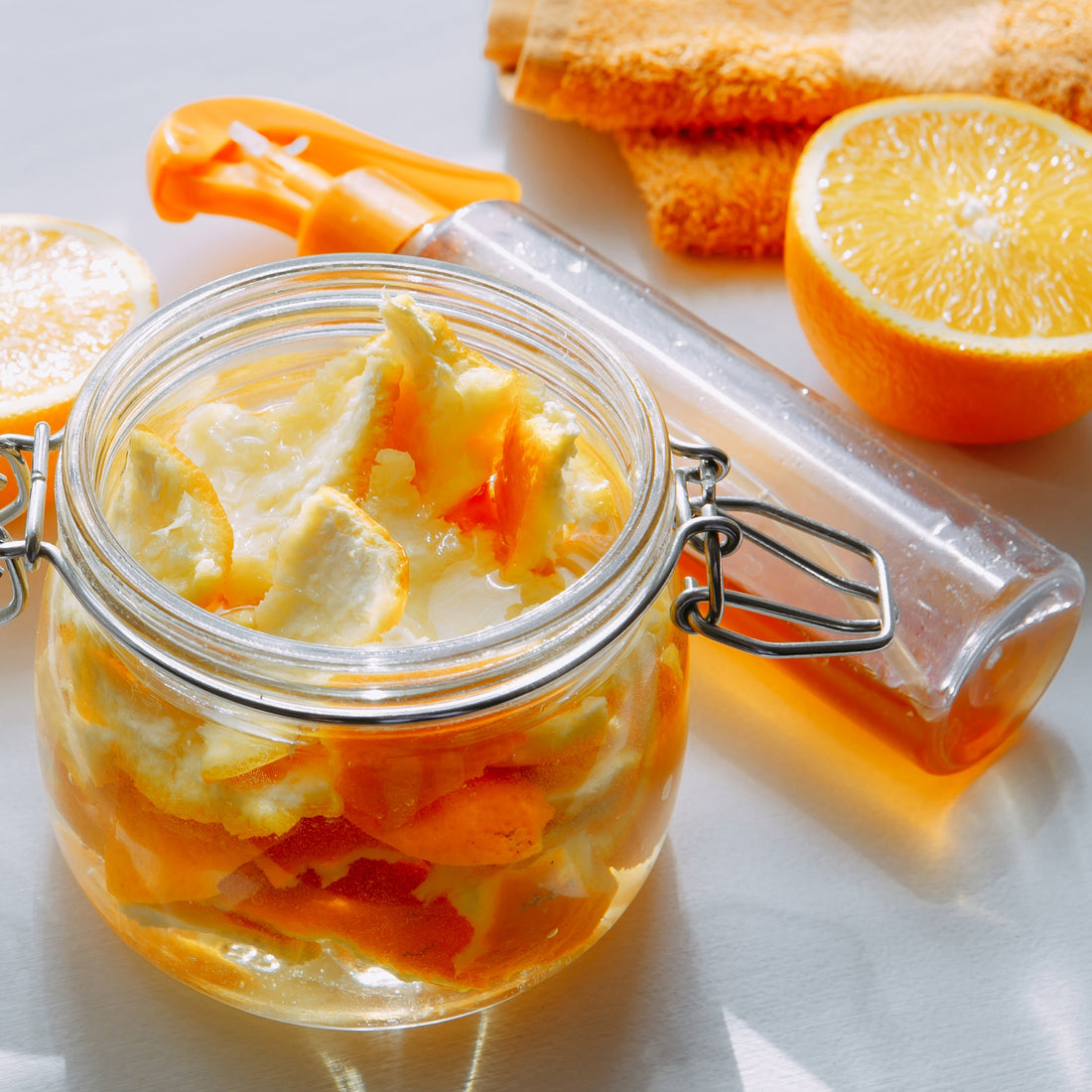The Ultimate Guide to Using Orange Peels for Cleaning: Nature’s Degreaser and Cleaner

Share
The Ultimate Guide to Using Orange Peels for Cleaning: Nature’s Degreaser and Cleaner
In Grandmother’s Kitchen, we value time-tested, natural cleaning methods that have been passed down through generations. One of the hidden gems is the use of orange peels. While oranges are a delicious and healthy fruit packed with vitamin C, their peels are often discarded as waste. However, orange peels are loaded with natural cleaning properties that can help keep your home spotless. This guide will explore the benefits of using orange peels for cleaning, how to make your own orange peel cleaner, and why it’s a fantastic, natural alternative to chemical cleaners.
Why Orange Peels?
Orange peels are much more than just fragrant kitchen scraps. They contain limonene, a powerful, natural solvent that excels at cutting through grease and grime. Limonene is often found in commercial cleaning products, but you can harness its power naturally at home.
Benefits of Using Orange Peels for Cleaning:
- Natural Degreaser: The limonene in orange peels effectively breaks down oils and grease.
- Pleasant Aroma: Orange peels leave a fresh, citrus scent that brightens your home.
- Eco-Friendly: Using orange peels reduces waste and avoids harmful chemicals.
- Cost-Effective: Creating your own orange peel cleaner is both economical and easy.
Making Orange Peel Vinegar Cleaner
Creating your own orange peel cleaner is simple and highly effective. This natural cleaner works well on various surfaces, such as countertops, sinks, and stovetops.
Materials Needed:
- Orange peels (from 3-4 oranges)
- White vinegar
- A large mason jar
- A spray bottle
Steps:
- Collect Orange Peels: Save the peels from several oranges, making sure they are clean and free of pulp.
- Fill a Mason Jar: Place the orange peels in a large mason jar, filling it halfway.
- Add Vinegar: Pour white vinegar over the orange peels until the jar is full. Vinegar acts as a natural disinfectant.
- Steep: Seal the jar and let it sit for two weeks, allowing the vinegar to extract the oils from the peels.
- Strain: After two weeks, strain the liquid into a spray bottle, discarding the peels.
- Use as Cleaner: Use the orange-infused vinegar as a natural cleaner for countertops, sinks, and other surfaces.
Using Orange Peels for Degreasing
Orange peels are particularly effective for degreasing kitchen surfaces and utensils. The natural oils in the peels help break down tough grease, leaving surfaces clean and shiny.
Degreasing Steps:
- Rub Directly: For tough grease stains on stovetops or ovens, rub an orange peel directly onto the greasy area.
- Make a Scrub: Mix ground dried orange peels with baking soda to create a powerful scrub for stubborn stains.
- Rinse and Wipe: After scrubbing, rinse with water and wipe clean with a cloth.
Other Uses for Orange Peels in Cleaning
-
Natural Air Freshener
- Simmer Pot: Simmer orange peels in water with cinnamon sticks and cloves to create a natural air freshener.
- Deodorizer: Place dried orange peels in sachets and use them to freshen up drawers or closets.
-
Garden Uses
- Compost: Add orange peels to your compost pile to enrich the soil.
- Pest Repellent: Scatter orange peels around plants to repel pests like ants and aphids.
-
Homemade Orange Oil
Materials Needed:
- Orange peels
- Vodka or grain alcohol
- Mason jar
- Dark glass bottle
Steps:
- Fill a mason jar with clean, dry orange peels.
- Pour vodka or grain alcohol over the peels until fully submerged.
- Seal the jar and let it sit for two weeks, shaking occasionally.
- Strain the liquid into a dark glass bottle.
- Use the homemade orange oil as a natural cleaner and degreaser.
Comparing Orange Peels and Lemon Peels
Lemon peels, like orange peels, are also excellent natural cleaning agents. Both fruits contain high levels of citric acid and essential oils that make them powerful cleaners. Here’s how they compare:
-
Similarities:
- Degreasing Power: Both contain natural oils that break down grease effectively.
- Fresh Scent: Both provide a fresh, uplifting scent.
- Eco-Friendly: Using either reduces waste and minimizes chemical use.
-
Differences:
- Scent: Orange peels offer a sweeter, more mellow fragrance, while lemon peels have a sharper, more invigorating aroma.
- Acidity: Lemon peels have a higher citric acid content, which makes them more effective for disinfecting and breaking down tough stains.
- Versatility: Due to their higher acidity, lemon peels may be more versatile for a wider range of cleaning tasks.
Using Lemon Peels for Cleaning
Just like orange peels, lemon peels can be turned into a powerful natural cleaner.
Lemon Peel Vinegar Cleaner
Materials Needed:
- Lemon peels (from 3-4 lemons)
- White vinegar
- A large mason jar
- A spray bottle
Steps:
- Collect lemon peels and place them in a large mason jar.
- Add white vinegar until the jar is full.
- Seal the jar and let it steep for two weeks.
- Strain the liquid into a spray bottle.
- Use the lemon-infused vinegar as a natural cleaner for various surfaces.
In Grandmother’s Kitchen, we have always understood the value of natural cleaning solutions. Using orange peels for cleaning not only offers an effective way to maintain a clean home, but it also provides an eco-friendly and economical alternative to chemical cleaners. From degreasing to freshening the air, orange peels are versatile and efficient. Whether you opt for orange or lemon peels, these natural solutions will help you create a cleaner, healthier home. Next time you enjoy a juicy orange or lemon, save those peels and put them to good use!


